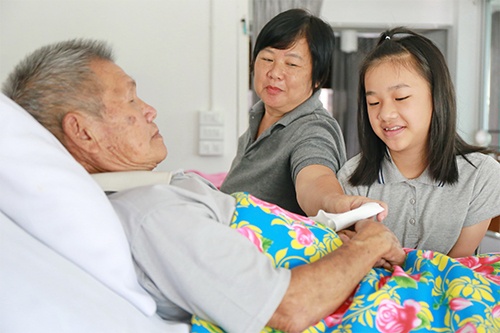
Caregiving is demanding. Whether you live next-door or 1,000 miles away, it is challenging. It is estimated there are over 34 million people providing unpaid care to ill, disabled, and elderly adults. Caregiving can range from social calls to your uncle to providing direct medical care for a parent. Not knowing how to navigate through the responsibilities can make you feel helpless.
Tips for Caregivers
As a caregiver, you are not alone. Here are some tips to assist you:
Allow your loved ones to make their own decisions regarding their care, if they are able. Cognitive changes are normal as people age, causing older adults to be slower in processing information and making decisions. However, that doesn’t mean they are incapable. Include them in all discussions about their health and care needs.
Hire a geriatric care manager. Most are licensed social workers or nurses and are trained to identify the care needs of older adults, and help families put together a plan. Their goal is to improve the quality of life for the older adult and help them live as independently as possible. To find a care manager, click here.
Enlist others to help. With your loved ones, make a list of the tasks they need assistance with such as mowing the lawn, shoveling the sidewalk, or grocery shopping. Friends, neighbors, or community organizations might be able to support them with these tasks. Don’t be afraid to ask others for help; you don’t know who is willing unless you ask. Also, your local agency on aging might be able to provide resources for you. www.Eldercare.gov can direct you to the correct agency. Provide everyone with your contact information, so they can reach you if they have any concerns.
Arrange for a home health aide. Aides can help with personal care, homemaking chores, and even health care. Often these services are paid for by government agencies or health insurance.
Consider home-delivered meals. Good nutrition improves the overall health and quality of life for seniors. Studies have shown that home-delivered meals reduce the risk of hospitalizations and defers nursing home placement. Ninety-two percent of seniors receiving home-delivered meals, report these meals allow them to remain independent and living in their own home. Home-delivered meals may be available through the local agency on aging (www.Eldercare.gov) or provided as a benefit through your loved ones’ health plan.
Long-Distance Caregivers
Even if you are not the primary caregiver, there are still many responsibilities you can undertake. Offering emotional support to the primary caregiver as well as respite care will be appreciated. The primary caregiver may be hesitant to ask for help, so offer to pay bills, organize paperwork, or update family and friends. As a long-distance caregiver, you can also help the primary caregiver identify benefits and programs for which your loved one may qualify. The website, www.benefitscheckup.org, is a good place to start.
Caregiver Support Groups
You may benefit from joining a caregiver support group. Meeting other caregivers will help you identify resources and exchange ideas. Be sure to take care of yourself during this time. Read this article for more ideas and download our free caregiver eBook, A Caregiver’s Guide to Taking Care of You.











